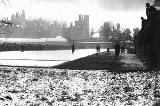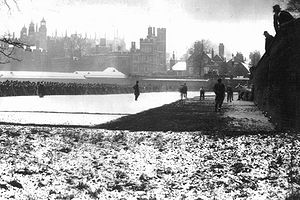
Eton Wall Game
Encyclopedia

Football
Football may refer to one of a number of team sports which all involve, to varying degrees, kicking a ball with the foot to score a goal. The most popular of these sports worldwide is association football, more commonly known as just "football" or "soccer"...
and Rugby Union
Rugby union
Rugby union, often simply referred to as rugby, is a full contact team sport which originated in England in the early 19th century. One of the two codes of rugby football, it is based on running with the ball in hand...
, that originated from and is still played at Eton College
Eton College
Eton College, often referred to simply as Eton, is a British independent school for boys aged 13 to 18. It was founded in 1440 by King Henry VI as "The King's College of Our Lady of Eton besides Wyndsor"....
. It is played on a strip of ground 5 metres wide and 110 metres long next to a slightly curved brick wall, erected in 1717.
The traditional and most important match of the year is played on St Andrew's Day, as the Collegers (King's Scholar
King's Scholar
A King's Scholar is a foundation scholar of one of certain public schools...
s) take on the Oppidans (the rest of the school). Although College has only 70 boys to pick from, compared to the 1250 or so Oppidans, the Collegers have one distinct advantage: access to the field on which the Wall Game is played is controlled by a Colleger.
Despite this, it is usual for them to allow the Oppidans to use it whenever they wish. On the annual St. Andrew's Day match, the Oppidans climb over the wall, after throwing their caps over in defiance of the Scholars, while the Collegers march down from the far end of College Field, arm-in-arm, towards the near end, where they meet the Oppidans.
The Wall Game is also played on Ascension Day, immediately after the early morning service on the roof of College Chapel. Various scratch matches are also played throughout the Michaelmas and Lent terms, where boys from different year groups, as well as masters, take part.
Scoring
The aim of the game is to move the ball towards the opponent's end of the playing area. In those last few yards of the field is an area called the "calx". In this area a player can earn a "shy" (worth one point) by lifting the ball against the wall with his foot. A teammate then touches the ball with his hand and shouts "Got it!". These two plays must happen within the calx. After this the scoring team can attempt a goal (worth nine points) by throwing the ball at a designated target (a garden door at one end of the field and a tree at the other end). Players can also score a kicked goal, worth five points, if he kicks the ball out and it hits a goal during the normal course of play.Play

When in Calx, a different type of Bully called a Count's Bully occurs. The fastest way to make ground is by kicking the ball upfield and out of play whenever it comes sideways out of the Bully – unlike most types of football, play is restarted opposite where the ball stops after it had gone out, or was touched after it had gone out
As such, the most common tactic revolves around the formation of a 'phalanx'. This consists of a tunnel (coming out from the wall, diagonally forward from the position of the ball) of players from one team who are crouching on hands and feet next to each other. Once the team in possession of the ball has formed a successful phalanx, it attempts to pass the ball down the 'tunnel' using the knees of the players forming it, to a player standing at the end of the phalanx, known as lines, whose job it is to kick the ball upfield. The team not in possession is constantly attempting to disrupt this, and win the ball back.
The game lasts up to an hour, with two halves of 30 minutes each. Many games end 0-0. Scoring goals (ten points) is very rare; they occur about once every 10 years and there has been no goals scored in the St. Andrew Day game since 1909. There was a goal scored in a recent scratch match (a less formal warm-up match for the St. Andrew's Day game) in October 2009. However, shies (worth 1 point) are scored more frequently, with the Oppidan side scoring shies in 2002 and 2004.
In the most recent St. Andrew's Day match, played on 21 November 2009, the outcome of the match was a 0-0 draw, with both sides failing to score. This marked the 100th consecutive St. Andrew's Day match in which no goals were scored by either team. There was, however, a near controversy in the latter stages of the match. With College attacking, a rogue photographer stopped the rolling ball with his foot, preventing it from going into Calx, and thus preventing College an opportunity to score a shy. It was the Oppidan side, however, who finished the match on the upper hand, themselves moving into Calx in the final stages, only for College to deny them from scoring.
Organisation
The Wall Game is organized entirely by boys, particularly by the Keepers of College Wall, Oppidan Wall and Mixed Wall. Famous past players of the Wall game include Boris JohnsonBoris Johnson
Alexander Boris de Pfeffel Johnson is a British journalist and Conservative Party politician, who has been the elected Mayor of London since 2008...
, who was Keeper of the College Wall, George Orwell
George Orwell
Eric Arthur Blair , better known by his pen name George Orwell, was an English author and journalist...
and Harold Macmillan
Harold Macmillan
Maurice Harold Macmillan, 1st Earl of Stockton, OM, PC was Conservative Prime Minister of the United Kingdom from 10 January 1957 to 18 October 1963....
. The First World War Flying Ace Arthur Rhys Davids
Arthur Rhys Davids
Arthur Percival Foley Rhys-Davids DSO, MC & Bar was a British flying ace during the First World War...
also played, representing College with Ralph Dominic Gamble
Ralph Dominic Gamble
Captain Ralph Dominic Gamble MC was born in Simla, India in 1897. The second child and the only son of Sir Reginald Arthur Gamble.His grandfather had been Dominic Jacotin Gamble, a veteran of the Crimean War and campaigns in New Zealand...
in 1915.
Members of the College Wall also annually commemorate the great Wall Game Player James Kenneth Stephen
James Kenneth Stephen
James Kenneth Stephen was an English poet, and tutor to Prince Albert Victor, eldest son of Albert Edward, Prince of Wales.-Early life:...
, making a toast at each year's Christmas Soc Supper with the words in piam memoriam, J.K.S (in pious memory, J.K.S). Despite its renown outside the school, only a very small number of the 250 or so boys in each year ever take part in the sport, unlike the lesser-known but much more widely played Eton Field Game
Eton Field Game
The Field Game is one of two codes of football devised and played at Eton College. The other is the Eton Wall Game. The game is like football in some ways — the ball is round, but one size smaller than a standard football, and may not be handled — but the off-side rules — known as 'sneaking' — are...
.
The Eton Wall Game has been played twice by all-female teams, to minimal success.
Popular culture
The British sitcomBritish sitcom
A British sitcom tends, as it does in most other countries, to be based on a family, workplace or other institution, where the same group of contrasting characters is brought together in each episode. Unlike American sitcoms, where twenty or more episodes in a season is the norm, British sitcoms...
Green Wing
Green Wing
Green Wing is a British sitcom set in the fictional East Hampton Hospital. It was created by the same team behind the sketch show Smack the Pony, led by Victoria Pile, and stars Tamsin Greig, Stephen Mangan and Julian Rhind-Tutt....
features a fictional game, Guyball
Guyball
Guyball is a fictional game featured in the British sitcom Green Wing. The rules of Guyball are never fully explained, and are designed to be as confusing and as difficult to understand as possible. However, Green Wing fans have attempted to create their own rules and Guyball societies...
(icon ), which parodies the obscurity of public school pastimes such as the Eton wall game. It is introduced by Guy Secretan
Guy Secretan
Guy Secretan is a character in the British sitcom Green Wing, played by Stephen Mangan. In Channel 4's The World's Greatest Comedy Characters, Guy was voted 34th.- History :...
, who learned the sport at the fictional school Whiteleaf (ˈ ). The object of the game is to throw balls in a "Topmiler", a wicker basket on top of a leather flying helmet. However, the rules of Guyball are never fully explained, and are designed to be as confusing and as difficult to understand as possible. Fans of the show have however created their own rules, and the game was occasionally played 'for real'.
In Terry Pratchett
Terry Pratchett
Sir Terence David John "Terry" Pratchett, OBE is an English novelist, known for his frequently comical work in the fantasy genre. He is best known for his popular and long-running Discworld series of comic fantasy novels...
's Discworld
Discworld
Discworld is a comic fantasy book series by English author Sir Terry Pratchett, set on the Discworld, a flat world balanced on the backs of four elephants which, in turn, stand on the back of a giant turtle, Great A'Tuin. The books frequently parody, or at least take inspiration from, J. R. R....
series, the Ankh-Morpork Assassins' Guild
Ankh-Morpork Assassins' Guild
The Ankh-Morpork Assassins' Guild is a fictional school for professional killers in Terry Pratchett's long-running Discworld series of fantasy novels...
has a far more sadistic variant of the "Wall Game", and is essentially an extreme hybrid of rock-climbing and dodgeball
Dodgeball
Dodgeball is any of a variety of games in which players try to hit other players on the opposing team with balls while avoiding being hit themselves. This article is about a well-known form of team sport with modified rules that is often played in physical education classes and has been featured...
.
In the first of Charlie Higson
Charlie Higson
Charles Murray Higson , more commonly known as Charlie Higson - also Switch - is an English actor, comedian, author and former singer...
's Young Bond
Young Bond
Young Bond is a series of five young adult spy novels by Charlie Higson featuring Ian Fleming's secret agent James Bond as a young teenage boy attending school at Eton College in the 1930s...
novels SilverFin
SilverFin
SilverFin is the first novel in the Young Bond series that depicts Ian Fleming's superspy James Bond as a teenager in the 1930s. It was written by Charlie Higson and released in the UK on March 3, 2005 by Puffin Books in conjunction with a large marketing campaign; a Canadian release of the same...
, the young James Bond comes to Eton and learns the rules of the Wall Game.
J.V. Hart's young adult novel, 'Capt. Hook', also features the Wall Game. The young Hook, an Oppidan at Eton College, plays in the St. Andrew's Day competition.

